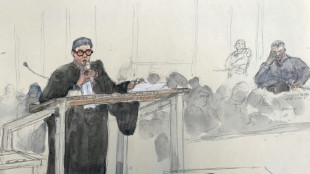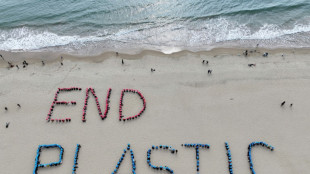
-
 Leicester set to appoint Van Nistelrooy - reports
Leicester set to appoint Van Nistelrooy - reports
-
Coffee price heats up on tight Brazil crop fears

-
 Maeda salvages Celtic draw against Club Brugge
Maeda salvages Celtic draw against Club Brugge
-
Villa denied late winner against Juventus

-
 Dortmund beat Zagreb to climb into Champions League top four
Dortmund beat Zagreb to climb into Champions League top four
-
Mbappe misses penalty as Liverpool exact revenge on Real Madrid

-
 Brazil's top court takes on regulation of social media
Brazil's top court takes on regulation of social media
-
Thousands still queuing to vote after Namibia polls close

-
 Trump taps retired general for key Ukraine conflict role
Trump taps retired general for key Ukraine conflict role
-
Canadian fund drops bid for Spanish pharma firm Grifols

-
 Argentine ex-president Fernandez gives statement in corruption case
Argentine ex-president Fernandez gives statement in corruption case
-
Mexico says Trump tariffs would cost 400,000 US jobs

-
 Car-centric Saudi to open first part of Riyadh Metro
Car-centric Saudi to open first part of Riyadh Metro
-
Brussels, not Paris, will decide EU-Mercosur trade deal: Lula

-
 Faeces, vomit offer clues to how dinosaurs rose to rule Earth
Faeces, vomit offer clues to how dinosaurs rose to rule Earth
-
Ruby slippers from 'The Wizard of Oz' up for auction

-
 Spain factory explosion kills three, injures seven
Spain factory explosion kills three, injures seven
-
US Fed's favored inflation gauge ticks up in October

-
 Defence lawyers plead to judges in French mass rape trial
Defence lawyers plead to judges in French mass rape trial
-
US says China releases three 'wrongfully detained' Americans

-
 New clashes in Mozambique as two reported killed
New clashes in Mozambique as two reported killed
-
Romania officials to meet over 'cyber risks' to elections

-
 Chelsea visit next stop in Heidenheim's 'unthinkable' rise
Chelsea visit next stop in Heidenheim's 'unthinkable' rise
-
Former England prop Marler announces retirement from rugby

-
 Kumara gives Sri Lanka edge on rain-hit day against South Africa
Kumara gives Sri Lanka edge on rain-hit day against South Africa
-
Namibia votes with ruling party facing toughest race yet

-
 Spurs goalkeeper Vicario out for 'months' with broken ankle
Spurs goalkeeper Vicario out for 'months' with broken ankle
-
Moscow expels German journalists, Berlin denies closing Russia TV bureau

-
 Spain govt defends flood response and offers new aid
Spain govt defends flood response and offers new aid
-
France says Netanyahu has 'immunity' from ICC warrants

-
 Nigerian state visit signals shift in France's Africa strategy
Nigerian state visit signals shift in France's Africa strategy
-
Stock markets waver as traders weigh Trump tariffs, inflation

-
 Tens of thousands in Lebanon head home as Israel-Hezbollah truce takes hold
Tens of thousands in Lebanon head home as Israel-Hezbollah truce takes hold
-
Opposition candidates killed in Tanzania local election

-
 Amorim eyes victory in first Man Utd home game to kickstart new era
Amorim eyes victory in first Man Utd home game to kickstart new era
-
Fresh fury as Mozambique police mow down protester

-
 Defeat at Liverpool could end Man City title hopes, says Gundogan
Defeat at Liverpool could end Man City title hopes, says Gundogan
-
Indonesians vote in regional election seen as test for Prabowo

-
 Guardiola says no intent to 'make light' of self harm in post-match comments
Guardiola says no intent to 'make light' of self harm in post-match comments
-
New EU commission gets green light to launch defence, economy push

-
 Opposition figures killed as Tanzania holds local election
Opposition figures killed as Tanzania holds local election
-
Taiwan Olympic boxing champion quits event after gender questions

-
 European stocks drop on Trump trade war worries
European stocks drop on Trump trade war worries
-
Volkswagen to sell operations in China's Xinjiang

-
 FA probes referee David Coote over betting claim
FA probes referee David Coote over betting claim
-
Serbia gripped by TV series about murder of prime minister

-
 Putin seeks to shore up ties on visit to 'friendly' Kazakhstan
Putin seeks to shore up ties on visit to 'friendly' Kazakhstan
-
New EU commission pushes for defence and economy spending

-
 Plastic pollution talks must speed up, chair warns
Plastic pollution talks must speed up, chair warns
-
Pakistan web controls quash dissent and potential


Thousands still queuing to vote after Namibia polls close
Logistical issues meant that thousands of Namibians were still waiting to vote in pivotal presidential and legislative elections late on Wednesday as the polling stations were scheduled to close.
The vote could usher in the desert nation's first woman leader even as her party, the ruling South West Africa People's Organisation (SWAPO) faces the strongest challenge yet to its 34-year grip on power.
Some voters told AFP they queued all day, for up to 12 hours, blaming technical problems which included issues with voter identification tablets or insufficient ballot papers.
According to Namibia's electoral law, those in the queue before the polls closed -- scheduled at 9:00 pm (1900 GMT) -- should be allowed to vote.
"We have the obligation to make sure that they pass their vote," said Petrus Shaama, chief officer of the Electoral Commission of Namibia (ECN).
The main opposition party, the Independent Patriots for Change (IPC) has blamed the ECN for the long lines and cried foul play.
"We have reason to believe that the ECN is deliberately suppressing voters and deliberately trying to frustrate voters from casting their vote," said Christine Aochamus of the IPC.
She said the party had "started the process" of approaching a court "to order the ECN to extend the voting time".
At one polling station inside Namibia's University of Science and Technology in the capital Windhoek, hundreds of people were still in line at 09:00 pm despite some having arrived at 6:00 am, an hour before polls opened.
It was a similar situation at the Museum of Independence, according to an AFP reporter, where one voter said he arrived 12 hours earlier and was still in line with hundreds of others.
- Unemployment -
SWAPO's candidate and current vice president, Netumbo Nandi-Ndaitwah, was one of the first to vote and called on Namibians "to come out in their numbers".
An estimated 1.5 million people in the sparsely populated nation had registered to cast their ballot.
SWAPO has governed since leading mineral-rich Namibia to independence from South Africa in 1990 but complaints about unemployment and enduring inequalities could force Nandi-Ndaitwah into an unprecedented second round.
Leader of the IPC, Panduleni Itula, a former dentist and lawyer said he was optimistic he could "unseat the revolutionary movement".
"We will all march from there and to a new dawn and a new era of how we conduct our public affairs in this country," the 67-year-old told reporters after voting.
Itula took 29 percent of votes in the 2019 elections, losing to SWAPO leader Hage Geingob with 56 percent. It was a remarkable performance considering Geingob, who died in February, had won almost 87 percent five years before that.
Namibia is a major uranium and diamond exporter but not many of its nearly three million people have benefitted from that wealth.
"There's a lot of mining activity that goes on in the country, but it doesn't really translate into improved infrastructure, job opportunities," said independent political analyst Marisa Lourenco, based in Johannesburg.
"That's where a lot of the frustration is coming from, (especially) the youth," she said.
Unemployment among 15- to 34-year-olds is estimated at 46 percent, according to the latest figures from 2018, almost triple the national average.
- Second round -
For the first time in Namibia's recent history, analysts say a second round is a somewhat realistic option.
That would take place within 60 days of the announcement of the first round of results due by Saturday.
"The outcome will be tight," said self-employed Hendry Amupanda, 32, who queued since 9:00 pm the night before to cast his ballot.
"I want the country to get better and people to get jobs," said Amupanda, wearing slippers and equipped with a chair, blanket and snacks.
Marvyn Pescha, a self-employed consultant, said his father was part of SWAPO's liberation struggle and he was not going to abandon the party.
"But I want SWAPO to be challenged for better policies. Some opportunistic leaders have tarnished the reputation of the party, they misuse it for self-enrichment," the 50-year-old said.
While lauded for leading Namibia to independence, SWAPO is nervous about its standing after other liberation-era movements in the region have lost favour with young voters.
In the past six months, South Africa's African National Congress lost its parliamentary majority and the Botswana Democratic Party was ousted after almost six decades in power.
B.Shevchenko--BTB
